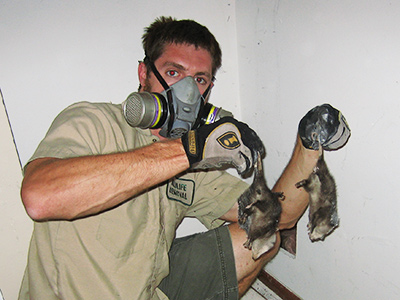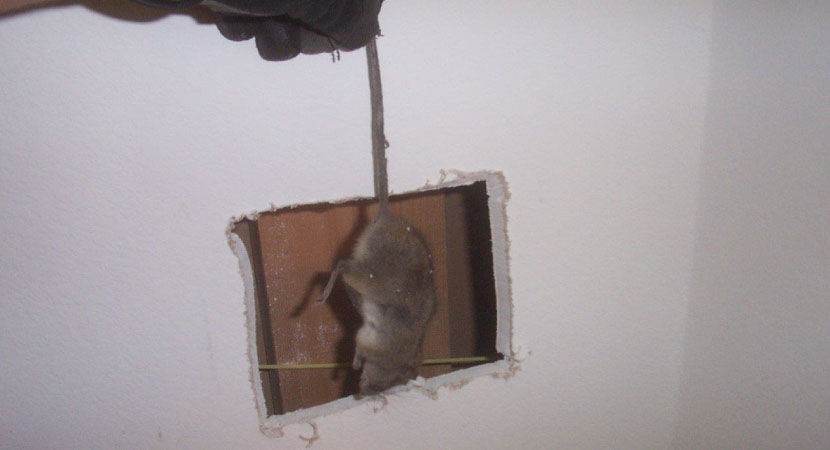Call me: 914-417-4559
Welcome to Westchester Dead Animal Removal! Got a terrible smell in your house, or do you see a dead critter on your property? We are an animal control company specializing in the removal of dead animals from your home, attic, basement, walls, yard, or any part of your property. You clearly don't want a dead animal in your house. Carcasses attract flies and give off terrible smells, not to mention the potential diseases rotting flesh can cause. Whenever we remove dead animals, we use 100% safe methods and make sure to disinfect your home and get rid of all traces of odor. Click here for Free Roadkill Removal and click here for Dead Pet Body Removal. For deceased wild animals in your home or property, call us anytime at 914-417-4559 to schedule an appointment for today! We come out fast! Some of the services we offer include:
- Dead Animal Removal
- Foul Odor Diagnosis
- Full Property Inspections
- House Damage Repairs
- Dead Body Location Services
- Proper Carcass Disposal
- Cleanup & Decontamination Services
- Deodorization Services
CALL US ANYTIME AT 914-417-4559

If you have a dead animal on your property, we do not recommend DIY disposal of the carcass. It is a hazardous material that can cause disease transmission and contamination. We can offer you the services that you need at a cost that you can easily afford. We have a team of experts that can pinpoint the exact location of the carcass immediately. They have gone through at least 100 hours of training to deliver satisfying and outstanding services. We promise that we will use the least invasive method when extracting the carcass. We have a flexible camera probe to inspect the inaccessible areas of your house. There are instances when cutting through your walls is unavoidable. However, we promise that we will repair the damaged part and make it look as good as new. You should not be too concerned about it since we have experts in conducting drywall repair services. After we make sure that the animal has been removed, we will place it in a secure container to prepare it for incineration. The area will then be sanitized and decontaminated to prevent the transmission of zoonotic diseases. We are also equipped to deodorize and conduct repair or home modification services.
What Prices Do We Charge?
Learn about dead animal removal costs - each situation is different!
What if you found roadkill or a dead animal such as a deer in a public place, and you want the city or Westchester County services to remove it for free? Click here for Free Westchester County Dead Animal Removal services. What if a farm animal like a horse, or your beloved pet dog or pet cat has died and you need the body taken away? Click here for Dead Pet Body Removal.
We are experts in dead animal removal, and take our job seriously. When removing dead animals, we do a COMPLETE job — not only do we remove the dead animal from your home or yard, we also decontaminate the area, deodorize it, and dispose of the animal or cremate it. If you aren't sure whether the stench in your house is due to a rotting carcass or another reason, we can sniff it out with our noses from our years of experience. We remove dead raccoons, dead opossums, dead skunks, dead squirrels, dead birds, even dead dogs and cats. We frequently remove dead rodents from inside walls, because poison kills rats and mice, who die in your house. We completely solve your dead animal problem by taking these steps:
- Sniff out the dead animal if it is somewhere in your home
- When necessary, for example if the animal is in a wall or under your house, cut a hole to remove the animal
- Remove the dead animal, safely and completely (and seal the hole if needed)
- Finish the job by decontaminating and deodorizing your home
- Properly dispose of the dead animal through incineration or other means
- Prevent it from happening again by finding out how they got in your house
Dead animal carcass removal is specialty work. Sometimes the job is simple, such as a dead opossum in the yard, in which case we can simply wear our gloves and respirator mask, bag the carcass, and take it away for incineration. Sometimes this is more complex, such as when the dead animal is under a home crawlspace, under a porch or deck or shed. Or if the animal is larger, such as a dog or a deer. The most complex cases are dead animals inside the house. The animal may have died inside the attic, or down in the walls, or the duct work, or any other part of the architecture. You may have a bad smell in your home, and you're not even sure what's causing it. We've removed not just dead animals, but rotting food, bad mold, etc. We specialize in locating the source of the smell, and we very commonly cut a hole in the ceiling or wall to remove the animal. We remove every bit of the carcass, mop up the juices, vacuum the maggots, spray it and wipe it down with disinfectant, cleaner, and we repair the hole we cut. In some cases we use ozone machines to neutralize odor.
Westchester Dead Animal Tip:
Why do rats die inside houses or attics? How to remove
Rats have maintained a troublesome relationship with humans for centuries. The critters infest human environments and cause significant damage. Humans have waged a war against rats for as long as the critters have caused them trouble.

Since rats commonly infest homes, it is quite common to have them die in houses or attics of natural and unnatural causes. Why do rats die inside houses or attics? How can the dead animals be removed? Let's find out below.
Humans could poison rats. Rat poisons have active ingredients such as anticoagulants. Anticoagulants cause internal bleeding and torture the critters to death. Poisoning is perhaps the commonest cause of the death of rats in homes or attics.
Rat poisons are touted as a means of efficiently getting rid of rats from an area. This is not the case as the poisons subject the critters to undue torture and kill them inhumanely.
Poisoning rats is not an efficient means of getting rid of the critters because it is inhumane. The poison can also be transferred from the rats to other critters. The unintended secondary poisoning of critters could result from the use of rat poisons.
When rat poisons begin to act on the critters, they tend to return to their nests to struggle with the symptoms. If they die, the carcass remains in the nest, which is probably a hidden location. Even when they infest attics, rats choose hidden spots to nest.
Apart from poisoning, rats, especially the young critters, could die from abandonment. Parents could inadvertently abandon their young if they die. If the parent is killed with a lethal trap, for example, the young critters will die from the lack of support.
Because of the tendency of young critters to die without the support of their parents, it is important that rat control and removal measures are applied with possible young critters in mind. When rats infest attics, they are bound to birth young ones. The attic should be inspected for young critters before control measures are applied.
Sick rats could also die in houses or attics. Sick rats are potentially infectious and are particularly dangerous to humans and pets.
Removing dead rats from houses or attics
Dead rats should be removed as soon as they are discovered. The decomposing carcasses produce a strong odor. Rat carcasses could also be sources of diseases.
The strong odor of decomposing rat carcasses could lead to their location. Find the carcasses and remove and dispose of them according to established guidelines.
Because of the strong odor of the decomposing carcasses, they could be found by following the odor. If the rat died in the attic, the exact location can be identified by following the smell. If the critter died in the attic, the removal will simply involve finding the exact location and removing it. If the critter died in a wall, ceiling, or any crawl space, the process could be more complicated. For example, if the carcass is in a wall, the wall will have to be cut to remove it.
Protective materials should be worn before the removal of the carcass is attempted. The required protective clothing includes gloves, masks, and overalls.
Proper disposal of rat carcasses helps to prevent the spread of different diseases. Place the carcass in a plastic bag and seal it. Also, choose an effective method specified by the local laws for the disposal of the critter.
After the removal of rat carcasses, the area should be disinfected to destroy all harmful materials associated with the critters. A strong enzyme-based solution will do the trick.
Repairs should also be carried out in attics and other spaces that rats infest. The repairs should be effected with the aim of restoring the area to its original state and preventing further rat infestations.
Rats commonly infest homes and attics. They could die in these areas from poisoning and sickness. Young rats could also die from the loss of the support of their parents.
When rats die in homes and attics, the property owners have to deal with the carcasses. Professional services are available for the removal of rat carcasses. The critters could also be removed without professional help.
Removing rat carcasses is especially important for eliminating terrible odors from the decomposing carcass and preventing disease outbreaks.
We service nearby towns such as New Rochelle, White Plains, Yonkers, Scarsdale, Mount Vernon, Mamaroneck, Bronxville, Rye, Tarrytown, Peekskill, Ossining, Mount Kisco, Eastchester, Harrison, Valhalla, Larchmont, Chappaqua, Hartsdale, Pleasantville, Dobbs Ferry, Armonk, Croton-on-Hudson, Elmsford, Bedford, Cortlandt, Yorktown Heights, Rye Brook, Hastings-on-Hudson, Pound Ridge, Katonah, Briarcliff Manor, Village of Pelham, Ardsley, Irvington, Thornwood, Sleepy Hollow.